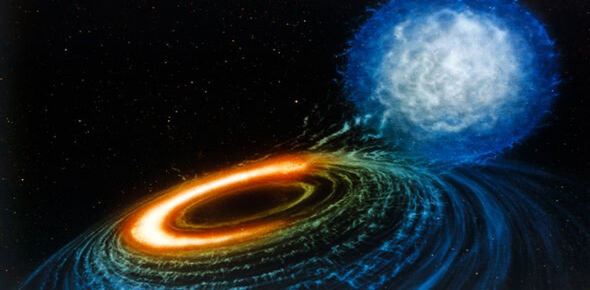Context
Recently, the National Aeronautics and Space Administration (NASA) shared an audio clip of a supermassive black hole located 250 million light-years away.
- The black hole in the Perseus galaxy cluster has been associated with sound since 2003.

About Black Hole
- A black hole is a place in space where gravity pulls so much that even light cannot escape.
- The gravity is so strong because matter has been squeezed into a tiny space.
- This can happen when a star is dying.
Types
- Black holes can be big or small.
- The smallest black holes are as small as just one atom.
- These black holes are very tiny but have the mass of a large mountain.
- Another kind of black hole is called "stellar."
- Its mass can be up to 20 times more than the mass of the sun.
- The largest black holes are called ‘supermassive’ and they have masses that are more than 1 million suns together.
- SgrA*
- The supermassive black hole at the center of the Milky Way galaxy is called Sagittarius A.
- It has a mass equal to about 4 million suns and would fit inside a very large ball that could hold a few million Earths.
Visibility
- Because no light can get out, they are invisible.
- Space telescopes with special tools can help find black holes.
- The gasses swirling around actually help in getting their images.
How Do Black Holes Form?
- Scientists think the smallest black holes formed when the universe began.
- Stellar black holes are made when the center of a very big star falls in upon itself or collapses.
- When this happens, it causes a supernova.
- A supernova is an exploding star that blasts part of the star into space.
- Scientists think supermassive black holes were made at the same time as the galaxy they are in.
Significance of the recent findings
- Insight into space exploration: The sound extracted from a black hole at the centre of the Perseus galaxy cluster gives us new insight into space exploration and research.
- It is a popular misconception that there is no sound in space: It originates from the fact that most space is essentially a vacuum, providing no medium for sound waves to propagate through.
- A galaxy cluster has copious amounts of gas that envelop the hundreds or even thousands of galaxies within it, providing a medium for the sound waves to travel.
